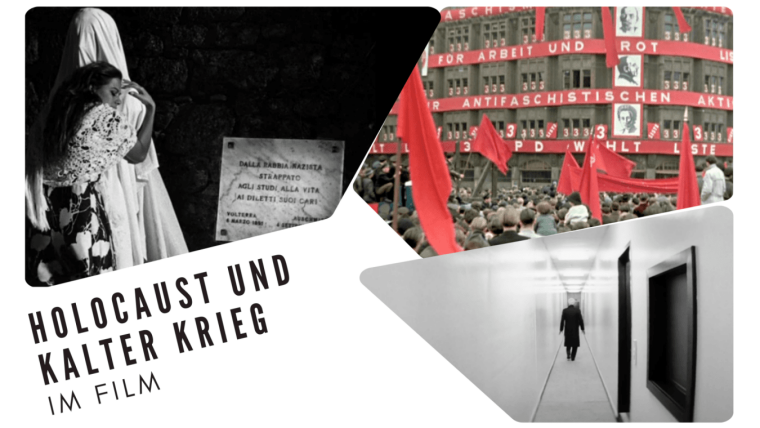
Project: "Memory or reappraisal? Experience- and knowledge production in Holocaust films of the FRG, GDR and Italy 1945–1990"
Project funded by the German Research Foundation (DFG)
Project leader: Prof. Dr. Bernhard Groß de
Research associates: Louisa Maier de, Naemi Haar de
Runtime: 2025-2028
The project is based on the observation that the feature films and documentaries on the Holocaust made in the former fascist countries of Germany and Italy during the Cold War are particularly heterogeneous in terms of aesthetics, reception and production. Aesthetically, the films oscillate between depicting a closed past or one that is open to the present; they oscillate between genre and documentary forms and between 'coming to terms' with a virulent past and 'remembering' a closed past: what is special is that these ambivalences often occur within one and the same film. The forms of reception are also ambivalent: Films by 'left-wing' filmmakers are praised by the conservative press and torn apart by 'left-wing' critics, for example; award-winning films also lead to domestic and interstate uproar.
The thesis is that between 1945 and 1990, especially in the countries mentioned, it was not yet clear, both within and between states, whether the films and the debate about them were about the representation of historical facts, i.e. coming to terms with them, or about remembrance, i.e. the representation of a closed past. This internal and external filmic contrast is to be understood as a struggle for the sovereignty of interpretation of the events, which is grounded in the respective ideologies of the blocs and their national forms. This struggle does not develop linearly from the 1940s to the 1980s, but is characterized by continuities and ruptures, by aesthetic alliances and exclusions, and thus by a perception of the Holocaust that is itself always historically changeable.
Based on the complete corpus of films from the three countries, the project therefore analyzes their feature and documentary films on the Holocaust between 1945 and 1990 and compares them with their reception, with the interests of their protagonists and with the film and cultural policy directives that these films triggered.
-
Subprojects
The project consists of two coordinated and mutually complementary sub-projects on the FRG/GDR (subproject 1, Louisa Maier, M.A. de) and Italy (subproject 2, Naemi Haar, M.A. de). Germany and Italy, as former fascist countries that were later affected by the formation of the bloc in an exemplary manner, have similar foundations, which, however, took different forms. Subproject 1 examines the impact of the sharp interstate polarization of the FRG and GDR on film production and reception, while subproject 2 examines film production and reception in Italy against the background of domestic radicalization (Christian Democratic/Communist). The project is framed by the work on a comparative country perspective (Prof. Dr. Bernhard Groß), through which the specific national characteristics of inter- and intrastate polarizations become understandable.
-
Cooperations
At the FSU Jena, the subject area “Holocaust and Cold War” is being examined in several research projects from different historical perspectives. The project “Remembrance or reappraisal? Experience and knowledge production in Holocaust films of the FRG, GDR and Italy 1945-1990” is networked within the university with the following projects:
- DFG-Project "KZ-Gedenkstätten als Bühnen der Systemkonkurrenz" de
- DFG-Project "Vernichtungswissenschaft. Nachman Blumental’s linguistic studies on the Shoah reconsideredExternal link"
- DFG-Project: „Aus dem Holocaust lernen? Gesellschaftliche Aufarbeitungsinitiativen und staatliche Bildungspolitik in beiden deutschen Staaten de“
-
Events
-
Publications